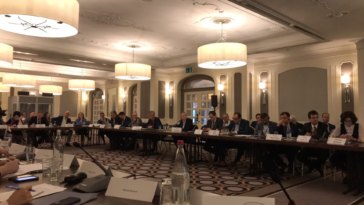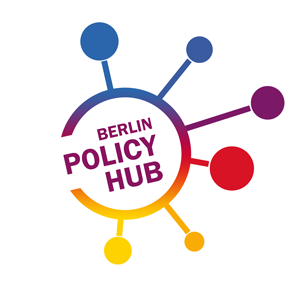The Eastern Partnership – A Reality Check and the Way Forward

The Georgian Institute of Politics, the George C. Marshall European Center for Security Studies and the Aspen Institute Germany together with the Institut für Europäische Politik, held a public discussion on the Topic “The Eastern Partnership – A Reality Check and the Way Forward” in Berlin on 25 September 2018.
The event brought together more than 80 participants, including representatives from civil society organisations, government officials and members of parliament from Georgia, Moldova, Ukraine, Germany and the U.S. The goal was to discuss the current state of affairs regarding the Euro-Atlantic integration process of the three Eastern European countries and to exchange views on the future of the Eastern Partnership (EaP).
In the opening remarks delivered by Rüdiger Lentz (Executive Director of the Aspen Institute Germany), Dr. Andrew Michta (Dean of the College of International Security Studies at the George C. Marshall European Center for Security Studies), Dr. Kornely Kakachia (Director of the Georgian Institute of Politics) and Dr. Katrin Böttger (Director at the Institut für Europäische Politik) all speakers stressed the importance of an ongoing dialogue between the EaP countries and their Western partners involving both civil society organisations and parliamentarians in order to bring together different perspectives from within and outside the region.
The debate was structured into two Panels: the first panel focused on the challenges which Georgia, Moldova and Ukraine are facing in implementing reforms required by the Association Agreements. Speakers representing civil society organisations of the three countries sought to provide a realistic assessment, a “reality check” of the current situation in Georgia, Moldova and Ukraine. Furthermore, the panel offered a reality check of the expectations existing on both sides.
The speakers on the first panel were Dr. Kornely Kakachia, Iulian Groza (Director of the Institute for European Policies and Reforms, Moldova), Olena Halushka (Head of IR/Advocacy, Anticorruption Action Center, Ukraine) and Dr. Stefan Meister (Head of the Robert Bosch Center for Central and Eastern Europe, Russia, and Central Asia at the German Council on Foreign Relations). The panel discussion was moderated by Dr. Katrin Böttger.
Based on the reality check conducted on the first panel,the second panel focused on identifying possible ways forward for the EaP countries’ domestic reform agenda and offered members of the national parliaments and officials the opportunity to share their assessment of the Eastern Partnership as an umbrella policy.
Contributions to the second panel were made by Tamar Khulordava (Member of the Parliament of Georgia, Chairperson of the Committee on European Integration ), Eugen Carpov (Member of the Parliament of the Republic of Moldova, Chairman of the Committee on National Security, Defense, and Public Order), Oksana Syroid (Member of the Verkhovna Rada of Ukraine, Deputy Chairperson of the Verkhovna Rada of Ukraine), Manuel Sarrazin (Member of the German Bundestag, Bündnis 90/Die Grünen, Member of the Committee on Foreign Affairs and Committee on the Affairs of the European Union), Dr. Bernd Forster (Head of Section for EU Relations with Eastern Europe, Russia, Southern Caucasus and Central Asia, German Federal Foreign Office) and Justin Wein (Deputy Chief of Staff, Congressman Price, House Democratic Partnership, U.S. House of Representatives). The panel discussion was moderated by Dr. Valbona Zeneli (George C. Marshall European Center for Security Studies).
Most of the panellists agreed that the Eastern Partnership Policy has enabled reform success in each of the countries and agreed that the policy achieved considerable progress in selected sectors. Nevertheless the representatives of the EaP countries also voiced criticism on the EU’s lack of offering further tangible perspectives for the EaP countries and of considering the security questions in the region more thoroughly. The speakers agreed on the need of a more tailored approach to European integration for each country by taking into account respective domestic obstacles. The continued dialogue between civil society organizations and politicians from within the region and from the EU were needed to further benefit from a mutual reality check. The EaP reality check event provided an excellent opportunity to contribute to this dialogue.
The sustained exchange with civil society organizations and political decision makers from all three countries of the Eastern Partnership provided new perspectives and opportunities for shaping the future relationship between Moldova, Ukraine and Georgia and the EU.

